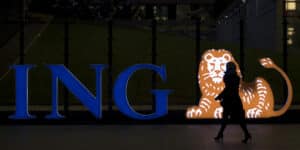ING Investments Review 2022 – that will be the topic of today’s article.
Explore ING Investments in 2022 and compare its offerings with those of Novia Global.
Nothing written here should be considered as financial or any other kind of advice.
For any questions, or if you are looking to invest in better solutions, you can contact me using this form, or via the WhatsApp function below.
Introduction
ING Group (Dutch: ING Groep) is a Dutch multinational banking and financial services corporation headquartered in Amsterdam. Its core businesses are retail banking, direct banking, commercial banking, investment banking, wholesale banking, private banking, asset management, and insurance services.

With combined assets of US $ 1.1 trillion, it is one of the largest banks in the world and consistently ranks among the 30 largest banks in the world. One of the ten largest European companies in terms of revenue.
ING is a Dutch member of the Inter-Alpha Group of Banks, a cooperative consortium of 11 prominent European banks. Since its inception in 2012, ING Bank has been included in the list of globally systemically important banks.
In 2020, ING had 53.2 million customers in over 40 countries. The company is included in the Euro Stoxx 50 stock exchange index. The long-term debt of the company as of December 2019 is 150 billion euros.
ING is an acronym for Internationale Nederlanden Groep (lit. “International Dutch Group”). The orange lion in the ING logo hints at the group’s Dutch origins.
ING is a global bank with a strong European base. Their 57,000 employees serve approximately 38.5 million clients, corporate clients and financial institutions in more than 40 countries. The company’s goal is to empower people to stay one step ahead in life and in business.
The products include savings, payments, investments, loans and mortgages in most of their retail markets. For their wholesale banking clients, they provide specialized lending, personalized corporate finance, debt and equity capital markets solutions, sustainable financial solutions, payments and money management, and trade and treasury services.
Customer experience is what sets them apart and they are constantly improving it. They also partner with others to bring revolutionary ideas to market faster.
Their shares are listed in Amsterdam (INGA NA, INGA.AS), Brussels and New York (ADR: ING US, ING.N).
When it comes to sustainability, they foster and finance society’s transition to a low-carbon future and are pioneering innovative forms of finance to support a better world. Thus, they are ranked #1 in the industry group of banks by Sustainalytics and are rated ‘AA’ by MSCI. ING Group shares are listed in the main products of the Sustainability and Environmental, Social and Governance (ESG) Index of leading providers STOXX, Morningstar and FTSE Russell.
You can find ING in over 40 countries, below you can find them.
Market leaders: Netherlands, Belgium, Luxembourg
Leading retail and wholesale banks
A cross-border customer engagement platform focused on mobile and delivering cost-effectiveness
Challenger Markets: Australia, Austria, Czech Republic, France, Germany, Italy, Spain
Digital retail banks are developing a scalable platform with a unified customer experience focused primarily on mobile devices
Expanding product capabilities
Wholesale banks

Growth Markets: Poland, Romania, Turkey, Philippines and our shares in Asia
Retail and wholesale banks in countries with high growth potential
Developing a differentiated customer experience based on a mobile-first approach
Wholesale banking: International network and global franchises
Extensive international customer base in all regions
Sector-focused client business in lending, capital structuring and consulting, transactional services, sustainable financial solutions, and financial markets.
The company pursues many goals that the company is guided by. The main goal is to empower people to be one step ahead in life and in business – reflects their belief in human potential. They do not judge, teach or tell people how to live. No matter how big, humble or grandiose, we empower people and companies to realize their own vision of a better future.
They know that people do not need banks, they need banking services. They promise to make banking hassle-free by removing barriers to progress and giving people confidence in their ability to make decisions and move forward. This promise frees them from the constraints that stand between them and their passions, and encourages them to do more that gives meaning to their lives.
Their goal guides them in everything they do. It is based on the company’s conviction that ING’s role is to support and advance economic, social and environmental progress, while at the same time providing healthy returns for shareholders.
“Do your thing” has become the company’s brand direction and ING’s first global slogan. This is how they formulate their goal and promise to make banking peaceful. “Do your thing” is not irresponsible behavior, but the freedom of people to live the life they want to live, knowing that they will make their world a little better.
To achieve their goal, they have defined the “Promise to customers” slogan. This includes four different ways to provide their customers with unique opportunities, here they are:
Clear and simple
Banking doesn’t have to be complicated and time-consuming. It’s all about clear products, clear language, fair prices, and simple processes that save time and money.
Always and everywhere
Banking must be possible anytime, anywhere, no matter where and how people access their products and services.
Authorize
The best financial decisions are informed decisions. Customers want to have relevant and relevant information at their fingertips. They need to understand the options available and their implications, both today and in the future.
Keep getting better
Life and business are moving forward. They will keep continuing to look for finding some ways to improve. With new ideas, new solutions, and new approaches to make life easier for their clients. This way, they can all be one step ahead.
As already mentioned above, ING’s strategy is based on empowerment and the promise to customers to make banking easy and understandable, accessible anytime, anywhere, and continually improving.
But banking is changing. It is being broken by new users, who are utilizing new technologies such as blockchain, robotics, and artificial intelligence. Customer expectations also change based on their online and smartphone experiences: personal, instant, relevant, and hassle-free.
Tech companies like Google, Facebook, and Amazon are setting the standard for how people interact with brands they love. To stay relevant and continue to provide customers with a differentiated experience, ING must be where they are: on digital platforms where they shop, communicate and do business.
The platforms are also scalable, open, and borderless, allowing users to experience the same everywhere. Often, the products of one bank are not much different from the products of another. They believe the quality of ING’s customer service sets it apart from others.
To create this superior customer experience, they have four strategic priorities: leveraging their advanced data processing capabilities to better understand their customers and meet their changing needs; innovate faster; go beyond traditional banking and develop new services and business models, and getting primary relationships.
By this, the company’s team means an increase in the number of retail customers with more than one ING product (including a checking account to which their salaries are paid) and an increase in their share of wholesale banking customers with anchor products such as credit and transaction services.
They will do this by simplifying and standardizing their products and processes, increasing operational efficiency, enhancing the company’s culture of productivity, and expanding the lending capabilities. So that all of the clients have the same ING experience everywhere.
Legal structure and regulators of ING

ING Groep N.V., a listed company, is the parent company of one main legal entity: ING Bank N.V. (ING Bank). ING Bank is the parent company of various Dutch and foreign banks.
ING Bank is under the direct supervision of the European Central Bank (ECB) under the Unified Supervisory Mechanism (SSM). The SSM consists of the ECB and the national competent authorities of the participating Member States. SSM is responsible for “prudential supervision” (financial soundness of financial institutions).
The ECB is responsible for specific tasks in the area of prudential supervision. The DNB remains responsible for prudential oversight over those powers that are not vested in the ECB, including oversight of payment systems and oversight of financial crime. Another Dutch financial sector supervisor, the Netherlands Financial Markets Authority, remains responsible for “overseeing the business” (assessing the behavior of players in the Dutch financial markets).
Shareholder influence
Shareholders are interested not only in a good long-term return on their investment but also in having a say in decision-making. ING is committed to a modern corporate governance strategy that takes into account the interests of all stakeholders, including shareholders.
Voting right
Each share in ING Groep N.V. gives the right to cast one vote. The right to vote can be exercised by a shareholder at general meetings.
Shareholders can also exercise their voting rights even if they are not present at the shareholders’ meeting by providing a power of attorney to a third party.
Appointment of members of the Management Board and Supervisory Board
The General Meeting has the power to appoint and dismiss members of the Management Board and Supervisory Board based on a binding proposal from the Supervisory Board.
ING Tax principles
Every aspect of their business, including the approach to taxation, has an impact on society. Therefore, they have decided to formalize their special approach in order to clarify the views on responsible tax behavior.
Agreement
As a global bank, they play a critical role in fighting financial crime and protecting the financial system from malicious behavior. This includes criminal activities such as tax evasion as well as aggressive tax evasion, which is not illegal but can harm the communities in which they operate. That is why, in line with the company’s values, principles and expectations of regulators and society, they do not want to facilitate such activities.
Business case
They believe in the principle that taxes should follow business and therefore profits are shared among countries where business value is created. They strive to comply with national and international laws and regulations, as well as standards such as the OECD Guidelines, and apply the arm’s length principle.
Relations with tax authorities
Wherever they operate, they strive to establish and maintain an open and constructive dialogue with local tax authorities and other government agencies based on the disclosure of all relevant facts and circumstances. In this dialogue, they aim to provide clarity and certainty in advance with respect to all relevant components of local taxation.
Transparency
They are transparent about the approach to taxation and the tax position. Disclosures are made in accordance with relevant internal regulations and applicable reporting requirements and standards such as IFRS.
ING Tax Department Mission
- Provide quality tax support to ING’s business and management.
- To protect ING’s tax position in accordance with applicable laws and regulations.
- Ensure that ING’s tax position is correctly reflected in our financial statements in conjunction with ING’s finance department.
- In all activities, wherever the company operates, they properly consider long-term considerations, manage risks and carefully weigh the interests of all stakeholders, while always respecting ING’s values.
Innovations at ING

Innovation at ING is not about the latest gadgets or gadgets, but rather about creating unique experiences for customers. Making their lives better.
Recognized as one of the most innovative companies by Forbes magazine, ING offers many ways to turn great ideas into products and services that customers really want.
These include internal innovation using the bank’s 25 million euro innovation fund, investing and partnering with financial technology companies (fintech) through ING Ventures, and developing their own unique innovative method, PACE, which has trained over 10,000 employees.
ING has laboratories in four cities around the world (Amsterdam, Brussels, London and Singapore) where they create and test new businesses, combining their knowledge and connections with the knowledge and skills of others.
ING Neo
To improve the speed and efficiency of their operations, they have combined all of the innovation activities into one business unit called ING Neo, which reports directly to the CEO. ING Neo will innovate for both customers and ING itself.
What ING Neo focuses on?
They are looking for new opportunities to solve problems and meet customer needs in many areas. This is the space of values that they want to destroy.
Housing
Take the initiative in helping customers buy a home. Create pre-sale opportunities for owners and buyers, incorporate financing into the bidding process to keep customers financially secure, and offer software-as-a-service brokers to better serve customers.
Trade
Automate and digitize trade with technologies such as blockchain and advanced analytics to improve supply chain efficiency and develop data-driven trade services.
Lending
Offer customers alternative and personalized lending options, digitize the lending process, and develop new types of digital assets.
Financial health
Helping clients make smarter financial decisions and achieve goals through meaningful, day-to-day interactions that are simple, personal, and intelligent. Think of wealth management services, multi-banking platforms for individuals and corporate clients, and subscription management services, among others.
Safe and compatible
Increase compliance by digitizing regulatory processes, actively protecting the financial system, offering our compliance and risk management capabilities as a service to other financial and non-financial companies.
Investing with ING
With the company’s service ING Living Super you will have the opportunity to invest in:
Stocks, ETFs and LICs
Living Super offers you access to selected securities in the S & P / ASX 300 Index, as well as a range of Exchange Traded Funds and Listed Investment Companies through additional real-time stock trading available after account opening.
Managed investments
Living Super lets you choose from a range of managed investment options, including multi-sector and single-sector options.
Term deposits
Living Super also gives you access to term deposits for 3, 6, 1 and 2 years (2 years term deposits are available only for super accounts), available after opening an account.
The benefits of investing in ETFs

ETFs have several advantages over traditional open-ended funds. There are plenty of advantages in investing in ETFs, but the best ones are trading flexibility, and cost savings.
Trading flexibility
Traditional open-ended mutual funds are traded only once a day after the markets close. All trading is done with a mutual fund company that issues shares. Investors have to wait until the end of the day until the fund’s net asset value will be announced before knowing by which price they obtained the new shares when they paid for them that day and the price they would get for the shares they sold that day. day. Trading once a day is fine for most long-term investors, but some people need a lot of flexibility.
ETFs are bought and sold during the day when the markets are open. The ETF share price does not change during normal exchange hours. Stock prices fluctuate throughout the day, mainly based on the fluctuating intraday value of the underlying assets of the fund. ETF investors will instantly know how much they paid to buy the stock and how much they received after the sale.
Nearly instant ETF stock trading simplifies intraday portfolio management. Money can be easily moved between certain asset classes, such as stocks, bonds, or commodities. Investors can effectively get their allocation on the investment they want within an hour and then change their allocation within the next hour.
Making changes to traditional open-ended mutual funds is more difficult and can take days. First, there is usually 2:00 pm ET when the stock opens. This means you don’t know what the NAV price will be at the end of the day. It is impossible to know exactly how much you will get when you sell shares of one open-ended fund or how much you should buy from another open-ended fund.
ETF trading is that much good, that it also gives investors the opportunity to make time-purposed investment decisions and make those investments in a big variety of ways. Investing in ETFs includes all trading combinations of investing in equities, including limit orders and stop-limit orders. Yo will be able to obtain ETFs on margin by simply borrowing money from a broker. Each brokerage firm has tutorials on trade order types and requirements for borrowing on margin.
Short selling is also available to ETF investors. Short positions involve borrowing securities from your brokerage firm and selling those securities in the market at the same time. The hope is that the price of the borrowed securities will fall and you can buy them back at a lower price later.
Reduced costs
Operating expenses are borne by all managed funds, regardless of structure. These costs include, but are not limited to, portfolio management fees, storage costs, administrative costs, marketing costs, and distribution. Historically, costs have been very important in predicting profit margins. In general, the lower the cost of investing in a fund, the higher the expected return on that fund.
The operating costs of ETFs can be optimized over open-ended mutual funds. The cost savings are the result of shifting the costs of customer service to brokerage firms that hold exchange-traded securities in customer accounts. Fund administration costs for ETFs can be reduced if the firm does not need to hire a call center to answer the questions of thousands of individual investors.
ETFs also have lower costs for monthly reports, notifications, and translations. Traditional open-ended funds are required to send reports and reports to shareholders on a regular basis. But not so with ETFs.
Fund sponsors will be responsible for giving this information only to authorized contributors, who are considered as direct owners of the units. Individual investors buy and sell shares of similar stocks in cooperation with brokerage firms. Usually, the brokerage firm assumes responsibility for serving those investors, not the ETF company.
Brokerage companies issue monthly reports, annual tax reports, quarterly reports. Reducing the administrative burden of maintenance and accounting for thousands of individual clients means ETF companies have lower overhead costs, and at least some of that savings is passed on to individual investors in the form of lower fund costs.
Pained by financial indecision? Want to invest with Adam?
Adam is an internationally recognised author on financial matters, with over 309.2 million answers views on Quora.com and a widely sold book on Amazon



